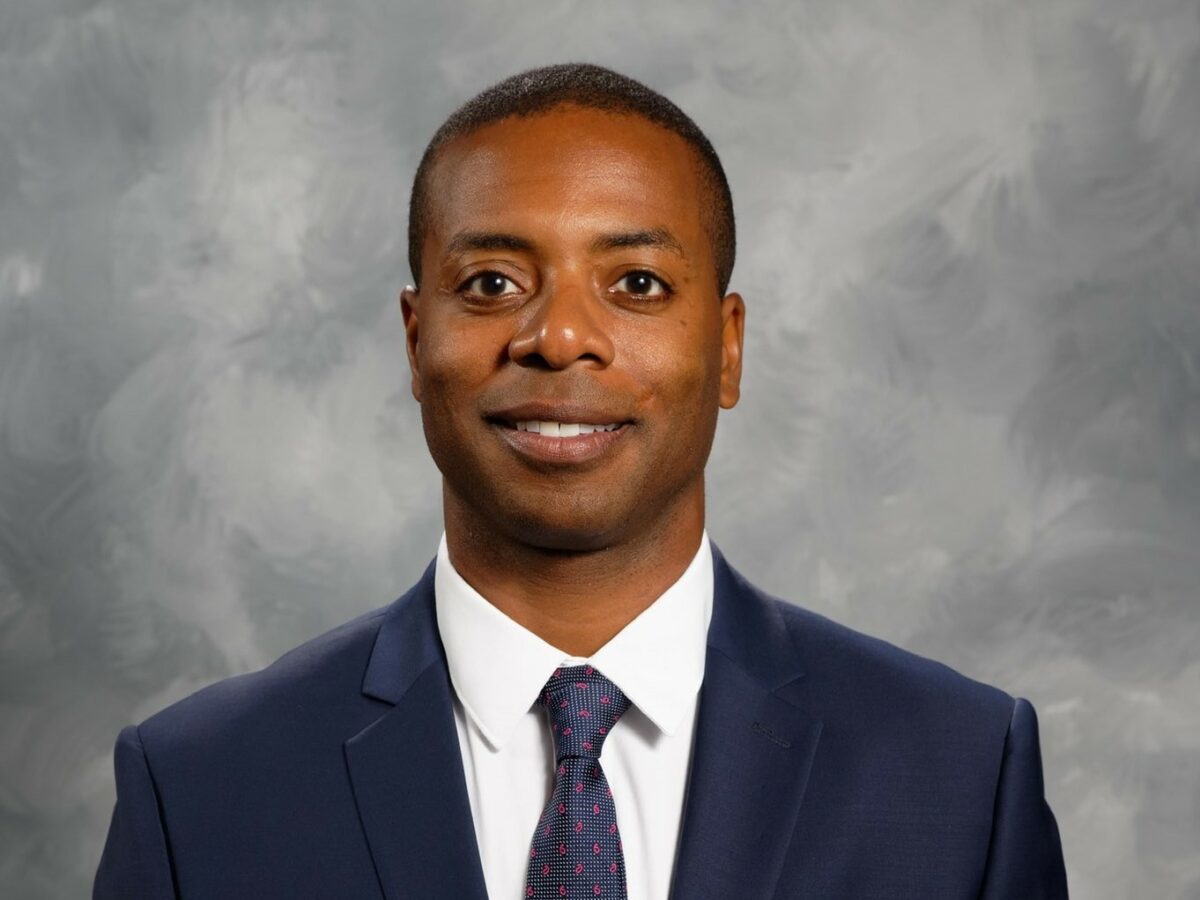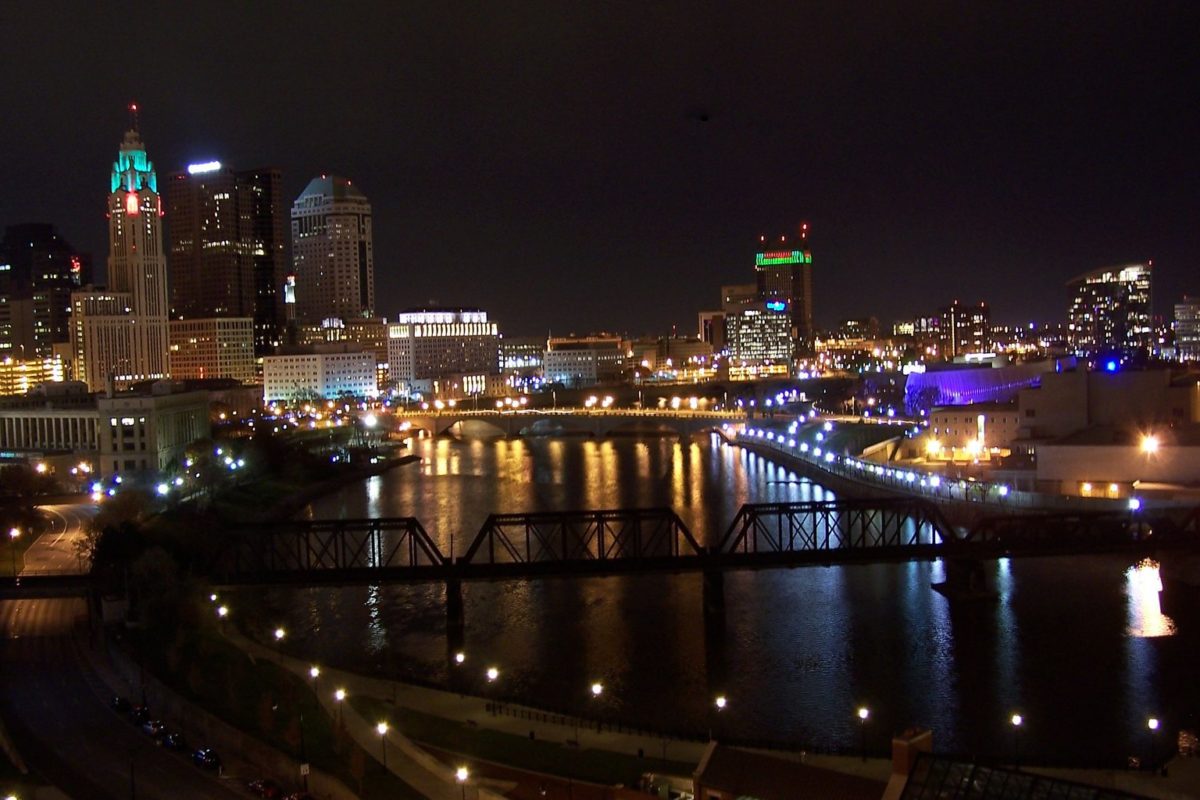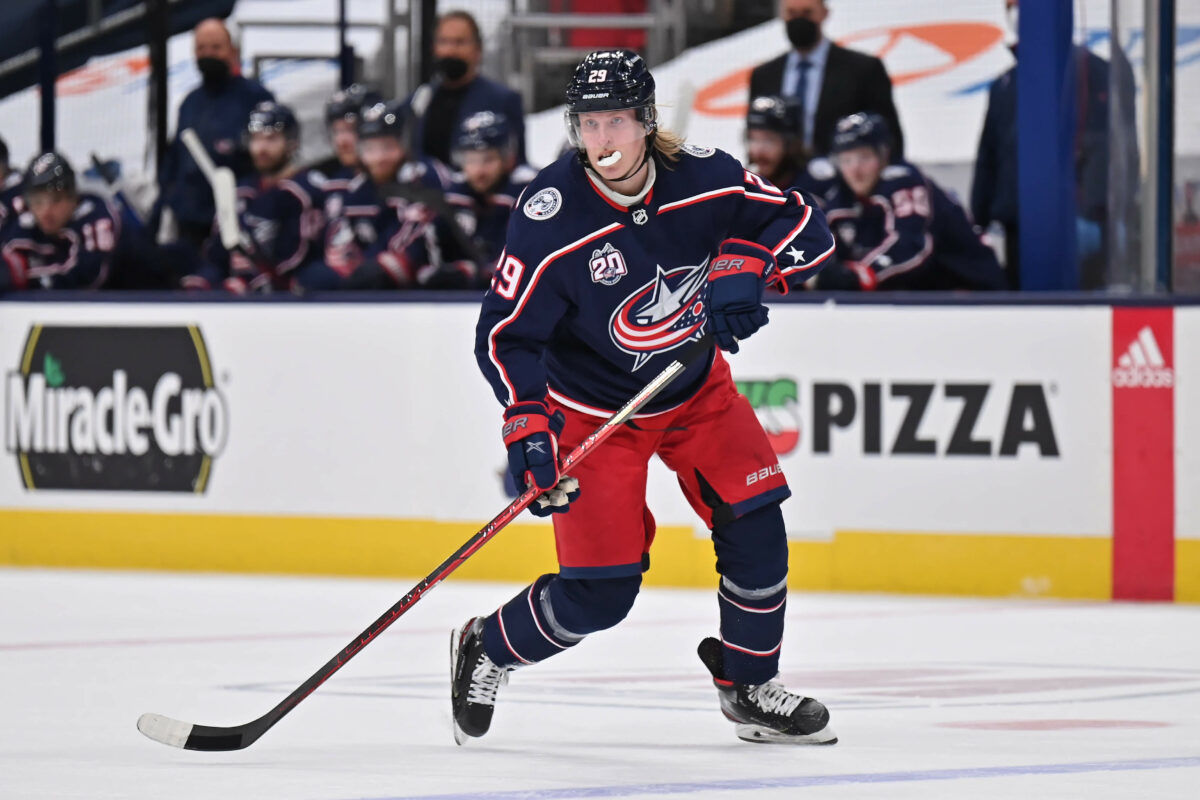During the 2000 NHL Expansion Draft, the Buffalo Sabres traded former seventh-round draft pick, Jean-Luc Grand-Pierre, to Columbus Blue Jackets. The defenseman spent the next three seasons with Columbus before being picked claimed on waivers by the Atlanta Thrashers.
Grand-Pierre’s impact on the hockey community goes far beyond being on the inaugural Blue Jackets team. His love for Columbus is what led to him establishing his roots in Columbus. He has since become even more recognizable in the hockey community across the city since replacing Bill Davidge on Blue Jackets Live on Bally Sports Ohio in 2019.
Grand-Pierre was kind enough to sit down with the Hockey Writers and discuss what it is like being one of the most recognizable people in the hockey community in Columbus, being a television analyst, and much more. That interview is below in its entirety. Enjoy.
Jean-Luc Grand-Pierre Interview
THW: Jean-Luc, thanks for agreeing to speak to us. What is it like being one of the major phases of the hockey community in Columbus up to being on the inaugural Blue Jackets team?
Grand-Pierre: I think, for me, I look at it as kind of like an official return to my roots, which is basically the Columbus Blue Jackets, this is, you know, not where I broke into the NHL, but where I spent most of my time, as far as a player, back in 2000 when the franchise just started and I came from Buffalo. And obviously, I really enjoyed it here because I stayed here post-retirement. So for me, it’s an honor, and it’s something that I’m really proud of.
Grand-Pierre Talks Broadcasting and Being an Analyst
THW: Of course, you have just recently become an analyst on Bally Sports Ohio, what made you decide that you wanted to be an analyst covering the Blue Jackets?

Grand-Pierre: For me, I think that the coaching part of the sport is something that I’ve never really had a huge interest in. I love coaching, you know, young players, like example, you know, I coached at the high school level here for five years, but for me, I was more passionate about kind of guiding the young kids through life more than the hockey part. To me, I’m looking at it as almost like a mentor, where you’re trying to show them good habits, not necessarily just on the ice, you know, a lot of it was on the ice, but kind of transferred on to their everyday life, and discipline more than the actual Xs and O’s of hockey. So I knew that’s probably not what my passion would be about. And I just started doing some radio here and there during the playoffs, and really enjoyed the broadcasting part of the sport. And that’s what kind of led me into it.
THW: So, kind of following up on that, what do you like most about that job?
Grand-Pierre: I think for me, is just watching the game, kind of like a fan, not like a coach necessarily, and being able to not necessarily educate but really relate to the people watching the game about certain aspects of the game. So, you know, Bill Davidge, who was there before me, obviously very accomplished in the broadcasting community, with somebody that had a little bit more of the coaching approach to things, which I will point things out, but I understand the frustration because since I retired, I’ve been watching the games as a fan number one more than an ex-hockey player or ex-coach. And I kind of feel like I bring that perspective into play.
THW: Watching one of the Blue Jackets preseason games, you made an interesting comment about how the radio broadcast seems less tense. Do you enjoy doing radio or television more?
You May Also Like: Blue Jackets’ Brad Larsen Showing Some Personality Behind the Bench
Grand-Pierre: Oh, boy, they’re completely different. The radio is fun because it’s more conversational. Kind of like what Jody (Shelley) is doing, right, so he is on TV, but there’s a little bit more conversation because there’s no real-time restriction as far as how long you have to get your point across. You can do it from play to play, player to player. You know, in the pregame and postgame where there are certain things we need to get to, which is kind of like covering the news a little bit. So there’s a little less, candid conversation, you know, of course, it’s candid when we talk but like, I feel like, during the game, it’s a little bit more loose, there’s a little more flow to it and no time restriction. So that’s the big difference that I found between doing the in-game analysis versus the pregame and postgame interaction.
Grand-Pierre Discusses Hockey’s Growth in Columbus
THW: You’ve been around Columbus for many years. What have you seen as far as the growth of hockey in the city?
Grand-Pierre: It’s crazy. You know, just yesterday, I was talking to my next-door neighbor, and he’s got a little five-year-old that’s going learn to skate. So that’s really exciting. You know, I see kids playing street hockey that didn’t move here from Pittsburgh or from Canada now. It’s just like at the high school level; there’s more teams than ever. You can see the chillers are full from six o’clock in the morning until 11 o’clock at night, and you know, we still need more rinks in Columbus. So just to see the growth of the sport, not only of the high school level, but the youth level, to me is incredible. And it’s a credit to the NHL and the Blue Jackets for bringing that to Columbus.

(John Mueller/Flickr / The Hockey Writers)
THW: What do you think has helped grow Columbus as a hockey city?
Grand-Pierre: Well, first of all, if you look at the location of Columbus, it is the Midwest. There’s a lot of people that are moving from different states that grew up with hockey, so I think that helped. Obviously, having an NHL team here in the city definitely helps with the youth, because you know, you take them to a game, and they’re like, hey dad or mom, I want to try this out. And to be honest with you, I play in some adult leagues in the summer a lot, and I find that a lot of older people got into hockey, not because they grew up with it necessarily, but because of the Blue Jackets. They also bring their kids that got into hockey to the arena every day and now decide that they want to play as well. If you look at the adult leagues around Columbus, whether it’s men or women, it’s incredible how many teams there are and how many tournament’s and games these guys and girls play because they just get addicted to it simply by watching their own kid playing and so it’s kind of a cumulation of all these different events, whether you have a background in hockey or you just learned a sport, they say hockey is for everyone. It is literally for everyone that wants to give it a try.
Grand-Pierre Shares His Opinion on the “Hockey Is for Everyone” Movement
THW: Sticking with the idea that hockey is for everyone, many consider hockey to be a sport that has yet to completely break the color barrier. As someone who has played the sport professionally, do you feel like the Hockey is for Everyone movement has made a difference in moving the sport in the right direction?
Grand-Pierre: I think it’s moving in the right direction. There’s definitely some room for improvement and growth. You know, to me, the way I look at it is, we’re always talking about how can we make the sport better and you have all these obstacles whether it’s the cost, the location, you know it’s much easier to get to a basketball court or baseball diamond than to get to an arena because you can just walk there play with your friends. Hockey, unless you’re playing street hockey, is a lot harder to do. So for me, as we’re growing as a city and getting more and more rinks, it’s going to get a lot easier. But to me, I think how many young kids can relate to the hockey players versus the basketball players. And you know, if you just look at social media, the NFL guys and the NBA guys are very active on social media. The teams are very active on social media, which we’re starting to see in the NHL. But you know, in the hockey world, it’s still a lot of business. Interviews, whether we’re talking about the players, the executives, as you know, in other sports, is a little bit more outspoken. And I think it’s a good thing, but it’s also something that may be hurting the sport of hockey because the social media presence is really not there unless you’re a hockey fan. You hear about the LeBron James’ and the Tom Bradys all the time. So I think it’s a combination of many things. But to me, the number one thing is, if the kids tried a sport of hockey, most of them will fall in love with it, but it’s how do we put sticks in these kids’ hands to really start loving the sport. Because especially in the US, right? You look at Columbus, let’s say, and you’re like, hey, the Buckeyes. I’m going to put them in football. The minute they’re born, they’re throwing a ball or playing baseball or playing football or basketball. But hockey is something that you don’t necessarily think about right away as you know, in Canada, the minute you’re born, the first thing you think about is like, I’m going to get him some skates and a stick. So I think it’s just the overall growth of the sport is going to happen over time. And, like I said, it is for everyone, whether it’s your boy or girl, black or white, it doesn’t matter. It’s just really about getting into those communities.
THW: Do you feel like there was more that needs to be done to make the sport more inclusive?
Grand-Pierre: You know, if I had the solution, I would have come up with it a long time ago. It’s something that’s more complicated than just saying, hey, come try hockey. It’s something that has to start from the parents—for example, me. My parent grew up in Haiti, where hockey does not exist. And the only reason I ended up in hockey is that when my parents moved to Canada, and I was born, you know, I played soccer in the summer because my parents knew about soccer. That’s what they grew up with. But hockey was the sport, and everybody played hockey. So they’re like, hey, let’s put him in hockey, give it a try, see if he likes it. If you come to Columbus from a different country and think about the Buckeyes, they are going to put him in football or whatever else. Hockey is not quite there at the forefront of the sport that you’re thinking about putting your kids in. So I don’t think it’s about making it more affordable or building more rinks more than the whole culture of the country or the area. Like, if you’re in Minnesota, I can tell you right now you get that hockey stick when you’re two years old. If you’re in Columbus, you know, it would have to be the parent that went to a game or something like that to really have that passion about the sport to want to put their kid.
Grand-Pierre Talks the Blue Jackets
THW: Okay, so I’m going to turn and focus more on the specific team now. What do you think are the strengths of this huge Blue Jackets team?
Grand-Pierre: I would say probably goaltending. And I think if you look at the forward group, the wings, with (Patrick) Laine, (Jakub) Voracek, and (Gustav) Nyquist, I think it’s going to be a pretty strong group offensively. So I think this is a team that’s going to score more goals than last season, and there’s no doubt about it, just because of the makeup of it. I think they’re going to be excited. You know, as far as the center position, there is (Jack) Roslovic, Max Domi, he’s going to come back, and I think (Sean) Kuraly is going to fill a gap, and then there is number three-four (number 34, Cole Sillinger), and then Boone (Jenner). So I really liked the forward group. I think their strings going to be goaltending, And most likely, the power play is going to improve as well.

THW: Following on that, what do you think will be their weaknesses?
Grand-Pierre: The weakness, I think on the back end, there’s two big holes to fill. With Seth Jones and David Savard gone brought a loss to build on. Now I know Adam Boqvist and Jake Bean are there to fill in for now, and they’re very young players. So obviously, there’s going to be an adjustment period. So for me, that’s where the big question mark is, is how will the defense be compared to the previous year because of the lack of experience?
THW: Lastly, what is your prediction for the Blue Jackets this season?
Grand-Pierre: It’s not going to be a Stanley Cup-winning team. I’m pretty sure about that. I’ve looked at the prediction, and everybody’s saying they are out of playoffs for sure. And listen, the Metropolitan division is an extremely hard division, but I don’t think the Blue Jackets are going to be last whatsoever. I think they are going to surprise a lot of teams. For me, it is can they sustain that success? Historically, the Blue Jackets has been a very slow team to start. If you look at the first month of the season, they’ve never been on fire. They always had a run around Christmas, but will it be too late by then? So for me, I think it’s going to be based off their start, but it’s really hard because you have a new coaching staff, a new system, a lot of new players, so can they really mesh together and make it happen on time? I think they’ll be battling for a playoff spot, I don’t see the Stanley Cup coming to Columbus this year whatsoever, but again, I don’t think it’s going to be a bottom-of-the-barrel type team whatsoever either.
We will get to see if Jean-Luc’s predictions on the team will be correct soon. The Blue Jackets open their season on Thursday at 7 p.m. when they take on the Arizona Coyotes in Nationwide Arena.
